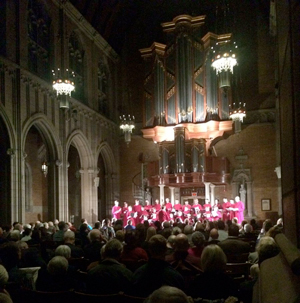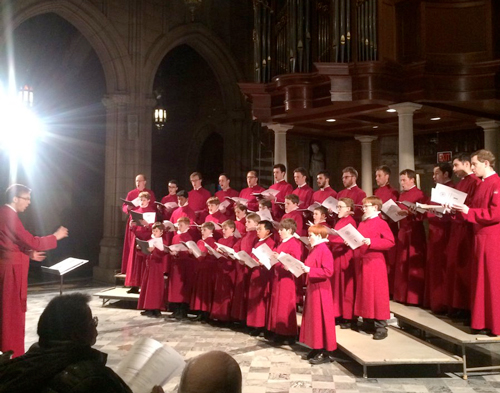by Timothy Robson

Despite his title, the primary responsibility for Robert Quinney (Organist of New College, Oxford) is in the chapel, directing the choir and its daily services at the college. Assistant Organist Timothy Wakerell, who served as accompanist, also performed two solo works on the cathedral’s 1977 Flentrop organ.
The program was an interesting mix of English choral standards, historical polyphony, and new pieces composed especially for the ensemble. The choir’s sound was clear and well-blended, and intonation was impeccable. From time to time, a welcome hint of individual voices emerged, helping to color the overall sound. Although Trinity was packed for the concert, robbing some of the space’s acoustical ring, the choir had no trouble filling the cathedral with sound.
Gerald Finzi’s rapturous God Is Gone Up opened the concert with sustained choral sound above a rhapsodic accompaniment. Following that were a set of three short a cappella works by William Byrd, that champion of Elizabethan music, who composed works for the new Church of England while writing Masses and Motets for his own Catholic faith in the background. The first, Vigilate, nescitis enim quando dominus domus veniat (Mark 13:35–37), exhorts the listener to watch for the coming of the Lord. The choral sound was robust and commanding. Throughout the second, Ave verum corpus, a meditation on the crucifixion, the choir’s serene phrasing was moving, especially so for the closing phrases “miserere mei” (“Have mercy on me”). The third, O Lord, make thy servant Elizabeth, showed Byrd in political mode, praying for the long life of Queen Elizabeth I. One could not help being touched by the applicability of the text to the reign of the current British monarch.
Timothy Wakerell, a very capable accompanist throughout the program, provided Johann Sebastian Bach’s Toccata in F, BWV 540 as an interlude. His brisk tempo at times came at the loss of contrapuntal clarity, and some of his registrations skewed balances between pedals and keyboards.

Ruth Byrchmore’s brilliantly expressive A Birthday, on a Christina Rossetti love poem, is worthy of wider performance. Starting with a solo treble voice, phrases overlap, adding parts to create a thick texture that blurs the text, but builds to an ecstatic climax. A second passage emphasizes Rossetti’s sensuous words. A dance-like coda expresses the joy of the last line, “My love is come to me.”
Toby Young’s delightful O God, make the door of this house is rhythmic, almost jazzy, and features unexpected chord progressions. The organ accompaniment is built on various ostinati.
The program continued with a set of three Baroque works by Francisco Guerrero, Clemens non Papa, and Heinrich Schütz. The Choir showed brilliant fluency in the style. Especially interesting was Clemens’s Ego flos campi, based on a sensual text from the Song of Songs. In its thick polyphonic texture, the seven parts sing simultaneously almost throughout.
Wakerell’s considerable skills were not put to best use in Olivier Messiaen’s “Dieu parmi nous” from La nativité. The Dutch Baroque organ at Trinity Cathedral has neither the tonal resources nor the sonic heft to adequately perform Messiaen’s great toccata announcing the arrival of God in the world.
The program closed with rich performances of three standards of the British choral repertoire: Patrick Hadley’s My beloved spake, W.H. Harris’s Faire is the Heaven, and C.V. Stanford’s powerful Te Deum in C. Here the New College Choir was completely comfortable, and comforting, transporting the listener back to a time when it was possible to know what was what in the world and in music.
An encore, a short arrangement of the folk song “Shenandoah,” was ethereal in its beauty and purity of tone.
Published on ClevelandClassical.com April 4, 2017.
Click here for a printable copy of this article



